As we arrive into 2025, the gaming market has become more flush with a wide variety of simulation games. Do you want to run a supermarket? There’s a simulation game for that! Running a laundromat? There’s a simulation game for that! Do you want to be a paramedic? There’s a simulation game for that too (as well as a GSC review)! Maybe it’s escapism to try something new in life? Or maybe it’s just the nice groove of the day-to-day of business management (with no real world consequences)? Regardless, these types of games have seen a boom over the past few years. Now, what happens if these simulation games take you outside of the bounds of our reality? Well, you get something like Potion Shop Simulator!
Releasing in March 2025 by Pebble Games and Bird Pals SIA, Potion Shop Simulator will give you a whirl at running a potion shop. While the game only has Single Player Mode, there is the ability to play in a co-op mode with friends. For the purposes of this review, we’ll only be exploring solo play. Imagine (as we get through the details) how much easier this might have been with an extra set of hands!
The Story
Congratulations! You recently graduated with a degree in Alchemy from Wizard University! With diploma in hand, it’s time to hit the streets and find a job. However, times are tough in our world (ain’t that the truth). Due to the economy, all entry-level positions in potion shops require five years of experience (stop being so relevant!). You’re eventually able to find a job…in a small village very far from home. Oh yeah, you’re also the only human in this village…and all the local potion brewing plants are unfamiliar to you. But at least we have a job!
Clik here to view.
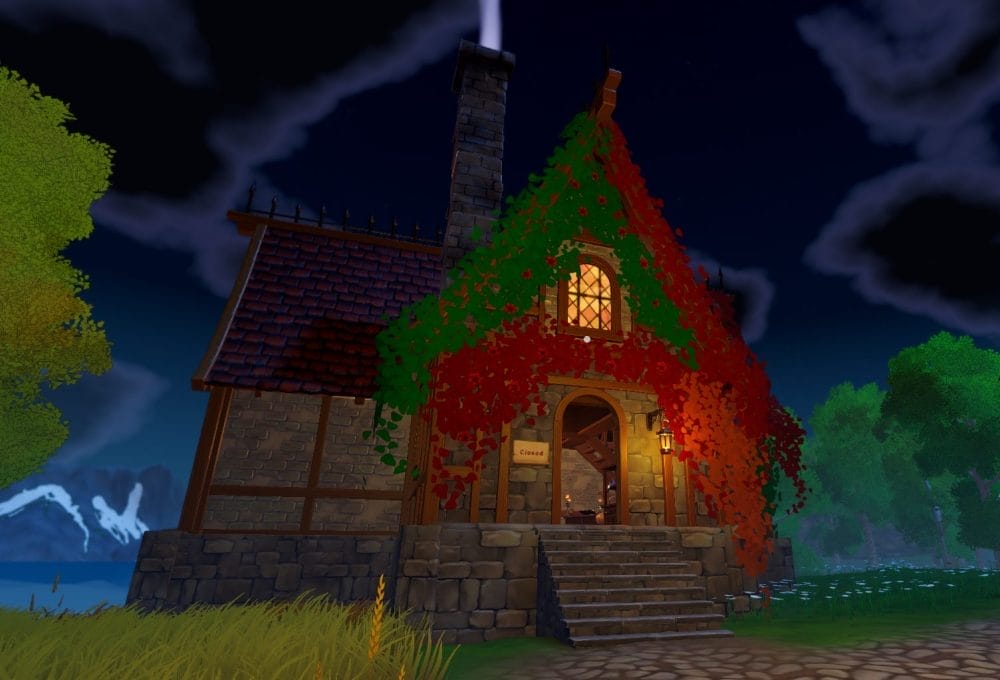
Upon loading into Potion Shop Simulator, you are greeted by Tim! Tim is a cute little dragon/wyvern (never specified) that will teach you the ropes of potion brewing! We learn in the travels of getting set-up that the prior Potion Shop owner was a Mervyn Quintilius. Mervyn mysteriously vanished during their research into “The 13th Potion”. The story, as expected, guides us towards what happened to Mervyn. Along the way, we’ll get the experience of running a Potion Shop and helping villagers along the way with requests.
Clik here to view.
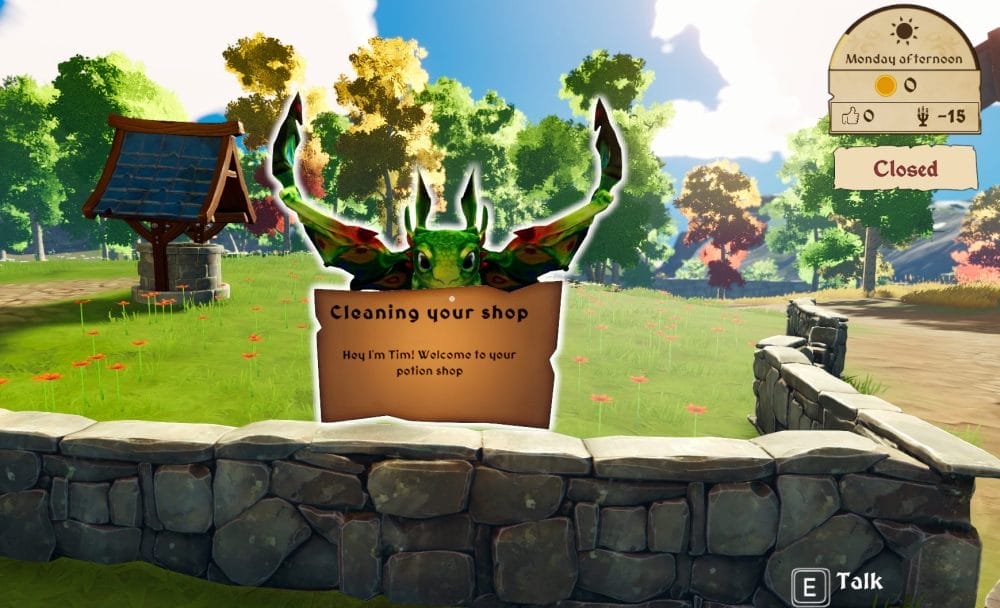
The Gameplay
To make a potion, first one must obtain ingredients! There are a total of eight “reagents” that can be harvested throughout the town. These ingredients refresh on a daily basis and will be the backbone of our brewing business. To brew a potion, simply add ingredients into your cauldron, stir, say some magical incantations, and BAM – potion brewed! However, it isn’t as simple as that!
Clik here to view.
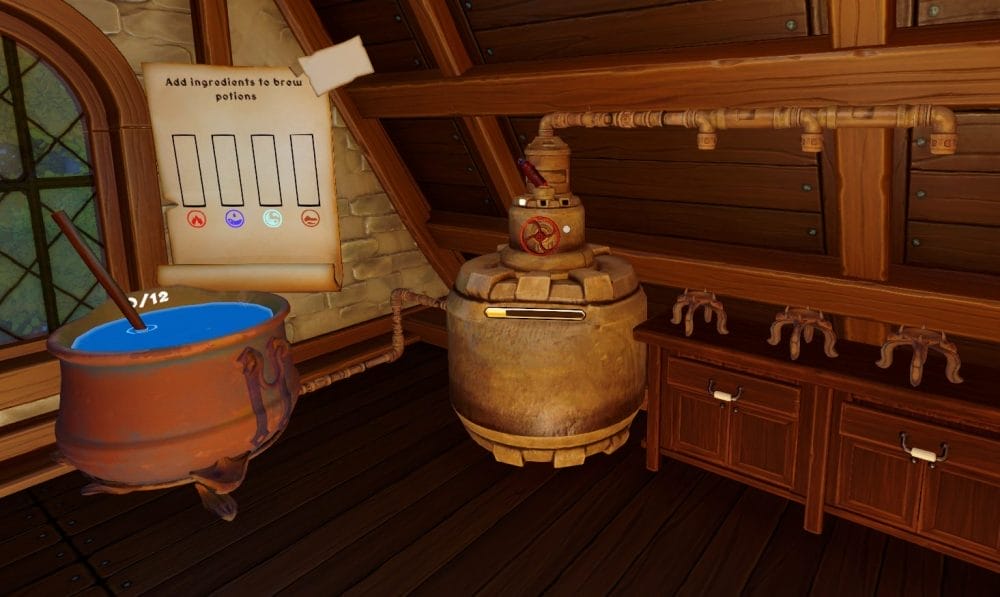
There are four classic elements that exist in our world – Fire, Water, Earth, and Air. It should come as no surprise that each of the reagents possess varying levels of each of these elements. Potions are crafted by adding these reagents in such a way that the elements are being combined in specific ratios. For example – Goblin Gut Soother (the first recipe you learn) requires a ratio of 1 Fire to 2 Air. Pretty straight-forward, right? Right! Well, as you might expect, it gets more complicated from there.
Clik here to view.
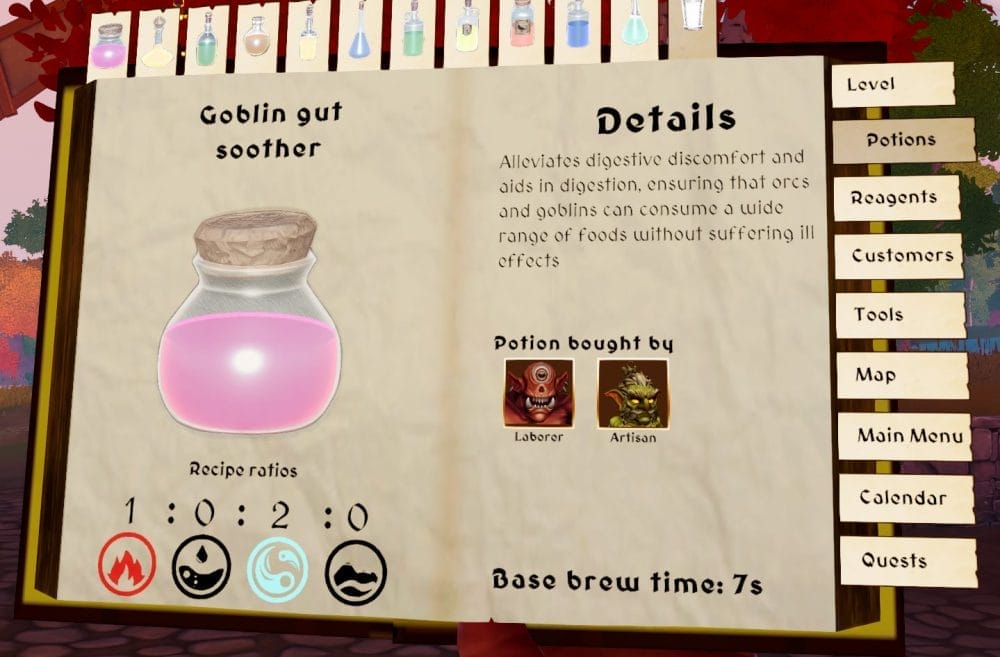
As an alchemist, you have the ability to brew potions with not only fresh reagents, but dried and powdered versions. Let’s take a look at Firebloom. Firebloom typically yields 2 Fire in its Fresh form, but in Dried or Powdered, it yields 6 Fire. Using your knowledge, you’ll have to find the perfect balance of fresh and dried/powdered reagents to brew what’s needed.
Clik here to view.
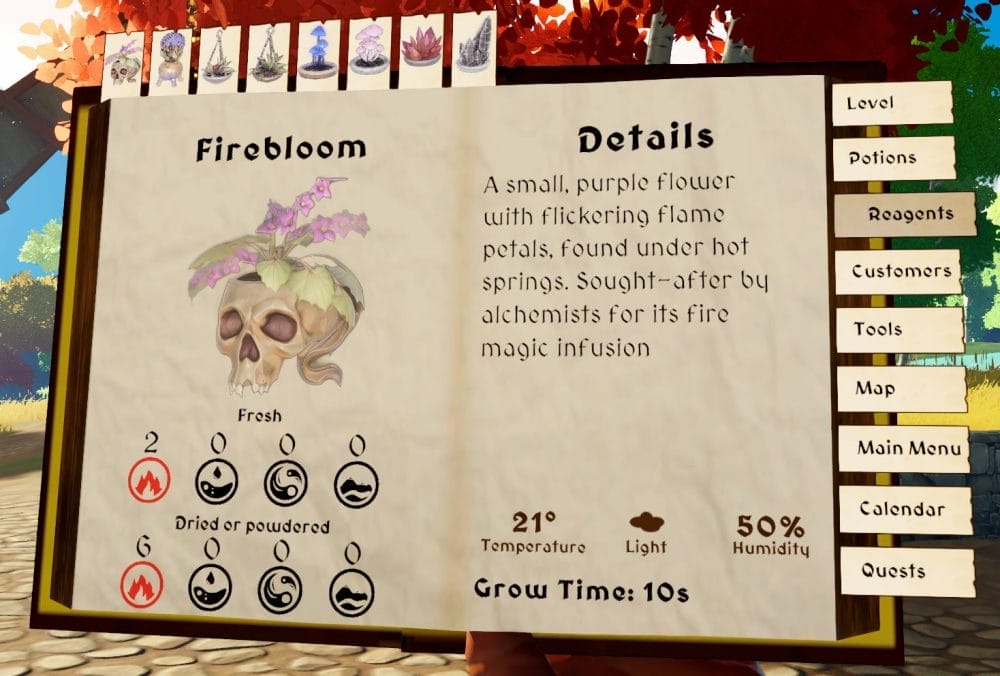
Once you have started brewing, you’ll learn that both Size and Quality of the potions will actually matter. A larger Cauldron will allow for larger potions and a Distiller (for purchase from a vendor) will improve the Quality of your potions.
The Shop
You have a Potion Shop. What does it do? It sells potions of course! This is the other component of the game – the actual management of the sales and improvements to your shop. You start off with a quaint little shop – not much room and not too many shelves to stock wares. As you expand the business, you will be able to extend your shop and draw in a wider variety of customers.
Clik here to view.
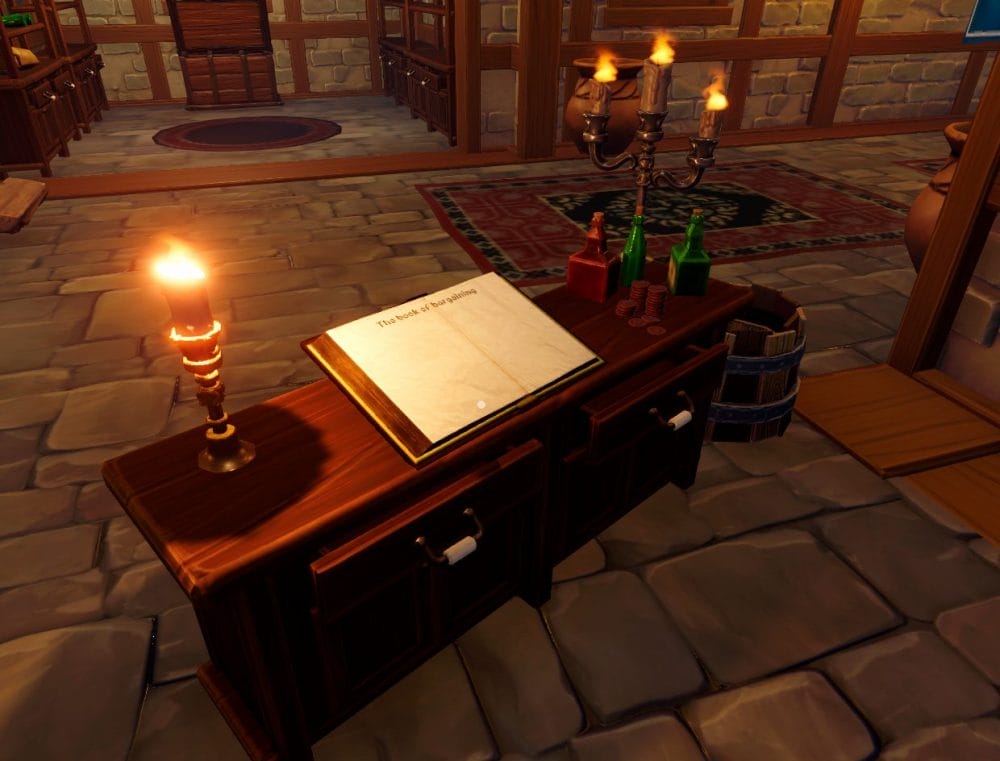
When making your sales, you will have two options for yourself – sell it for the listed price in the book or haggle and attempt to make a few extra coins. The higher the level of customer, the harder that haggling process will be, so try and find a balance of knowing when to haggle and when to just sell. Haggling itself is a little quick time event (which I actually thoroughly enjoyed).
There is also the option of purchasing a Greenhouse, which will sit nicely right next to the main shop. It’s in this little greenhouse where you will be able to grow your own reagents, as opposed to running around town to harvest them each day. The catch – each reagent has its own preferences of temperature and humidity, so you’ll need to plan them out accordingly.
The Upgrades
Throughout the town, there are a variety of Merchants, including:
- The Carpenter Workshop – Purchase upgrades to your physical shop and have new pieces of furniture put in that will increase your shop’s Appeal.
- The Alchemy Shop – Purchase upgrading tools for the trade that will allow more gathering, more drying of reagents, and other facets of your alchemical work.
- The Plant Shop – Feeling lazy? Purchase some fresh reagents to grow on your own, as well as powdered versions of all the reagents.
- The Decoration Shop – Give your shop some swag and increase its Appeal!
Appeal & Reputation
Now, I keep mentioning Appeal. Why does Appeal of the shop matter? It matters because at the onset, your dumpy little shop will only attract the Laborers of town, who don’t have a lot of gold to spend. A fancy rug here and a nice wheel of cheese there, along with a fancy hourglass, and you are suddenly attracting the Knights, Nobles, and Lords of town to sample your wares!
As you increase your Shop Appeal, a wider variety of customers will visit your shop. Every customer type has their own unique sets of Potion Types, Sizes, and Quality, so always be aware of who are your regular patrons and what they want. If you make those sales that local residents want, your Reputation will increase. Don’t have what they want? Prepare to hear some nasty words about how your shop doesn’t cater to their needs and see your Reputation dip. The combination of Appeal and Reputation are what will allow you to continue leveling yourself up within the game.
Clik here to view.
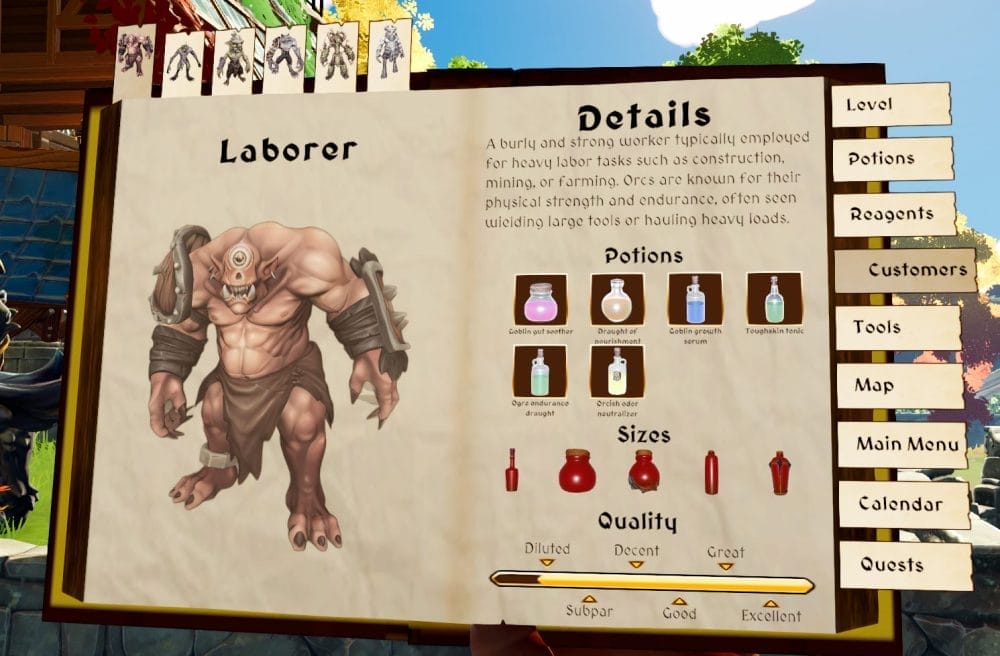
Now, I have spent several paragraphs rambling about the game. But how did it actually play? Let’s dive into it!
The Good
Now, from right off the bat – the Potion Shop Simulator is pretty! Vivid colors and environmental effects really do transport you to another world. It does, however, bear saying that it’s not as hard to be a pretty game nowadays as it did in 2005.
Clik here to view.
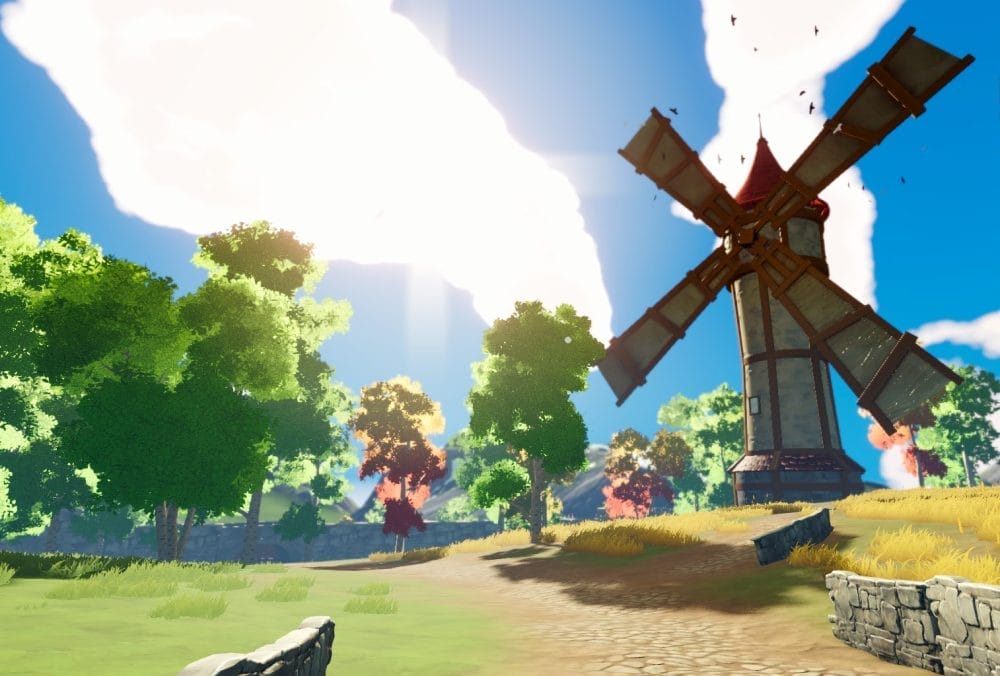
There is some limited voice-over in work in this game, although much of what consists of dialogue are the grunts of both joy and displeasure from your local residents of town. However, this is definitely a game where the need for VA work is not really necessary in my book. That said, it’s still a nice touch!
One of the aspects I did enjoy about the game were the very tactile facets of your day-to-day life. Going to pick reagents, putting them on the drying rack, grinding them in your mortar, adding powdered ingredients to your cauldron and giving it the special stir that it needs. It’s easy to get lost in the day. But never fear – there are regular events throughout the week that will change up what you’re doing. Whether it be sales at some of the merchants, Market Day, or even a day of increased tourism to the town, every day presents its own unique opportunities and challenges.
The Bad
One of the BIGGEST gripes that I have with Potion Shop Simulator are the Quests. Not for the story that they tell or what they have me do, no no! It’s the fact that the game would routinely start re-showing quest icons…for completed quests. These Quest icons appear on your map too, and they never seem to actually go away, despite completion. There was also a nice Wolf Knight who had a quest that I completed….and is still standing in front of my shop to this day.
Clik here to view.
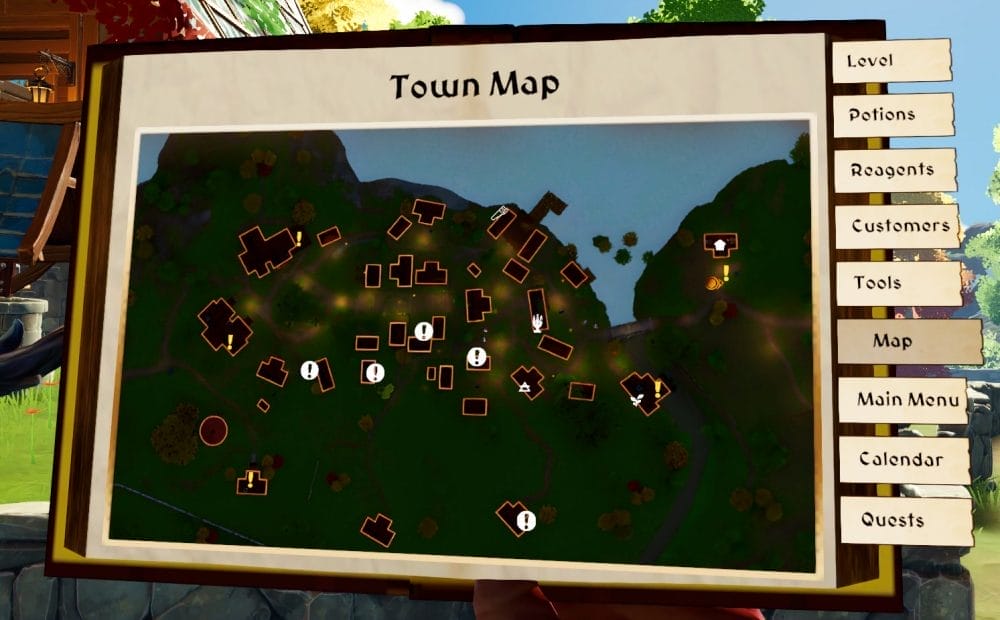
Towards the latter part of the game, there were quests that I started which required a time component within the game. But because of the ongoing glitches with Quests, I could never get a sense of “OK, did they actually start this Quest?”. Last thing about Quests – after completing the Main Quest, it now proceeds to show me the final cinematic sequence each time I boot up my save file.
As I noted above, the world was very pretty. But upon exploring it, you realize it is empty. Most buildings in town cannot be entered and most citizens cannot be spoken to. Which leaves me with the question of why make the town so big if nearly 90% of it cannot be interacted with? As a result, it also makes travelling around town take much longer than need be.
There were also several random hiccups I would run into when doing certain tasks. One of the biggest examples was the Bottler. Later in the game, you can expand your Bottler to bottle up to three potions. However, there were several instances where I would try to make several potions, only for the game to tell me that something was blocking the bottler, which would then force me to change the sizes of potions I would inevitably sell, which does matter!
Some of the more minor things I noted in my playing of this game (all in all, I sunk about 17 hours into the game):
- The music got very repetitive very quickly in the game. My recommendation – turn on your own tunes – you will start to dislike the bardcore in the game quickly.
- While the game notes that it does support controller play, it felt a little more clunky and I opted to stick with mouse & keyboard for the duration of my coverage.
- You can jump in-game. However, your jump height is so low that it makes clearing most obstacles near impossible. I would say, either ditch jumping all together, or allow the player to jump a little higher.
My last qualm with the game: The Shop Inspector. When he arrives, all your plans go out the window and you need to brew him some potions or he will write a scathing review of your shop that will tarnish your Reputation. Now, the interruption is not what I minded – it was the fact that any work with this little goblin (no, he’s an actual goblin) was messy and didn’t seem to work. He asked for five potions – I brewed five potions. He then proceeds to sit in my shop for the remainder of the day, leaving once the day ends, stating that I did not meet his expectations. And yet my Reputation went up??? It irked me to no end.
The Overall
I like simulation games. They’re fun little rabbit-holes to trundle down and live the life that, well, maybe you don’t want to live, but maybe you’re curious about? That being said, as more and more of them are being released to the masses, the wider the quality of these games are.
Despite my concerns, issues, and hiccups with my playthrough of this game, I did genuinely enjoy it! Will I 100% it and reach the top tier of Shop Owner in game? Maybe, but I can certainly say that I wouldn’t say no.
My sincere hope – Pebble Games and Bird Pals SIA give this the attention that it needs and fix some of the quality concerns that exist in the game, with the hope that maybe we see more content down the line and that this is just the first step in the Potion Shop Simulator universe.
Potion Shop Simulator will be available for purchase on Steam on March 5, 2025.
Clik here to view.

Gamer Social Club was provided a review code for the purpose of this review. This review was played on PC (Steam).
The post Potion Shop Simulator Review appeared first on Gamer Social Club.